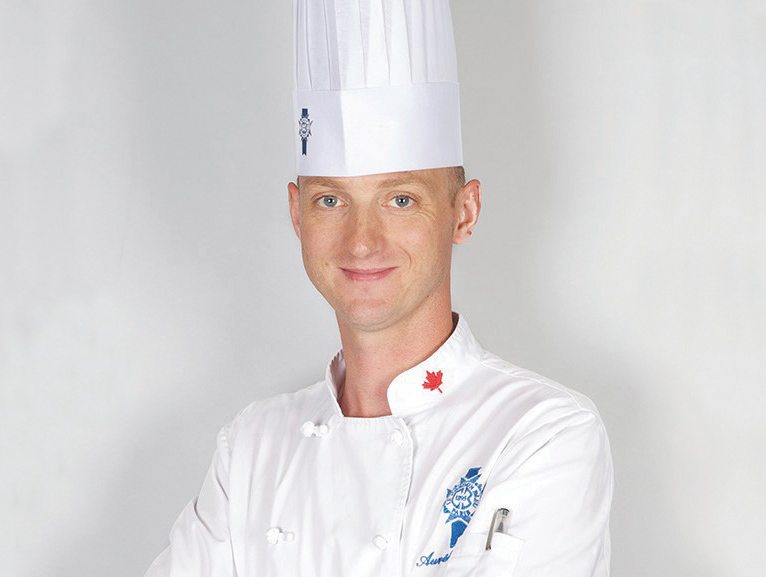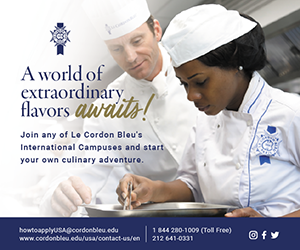Origin: Lille, France
Professional Background:
Cuisine Chef Instructor, Le Cordon Bleu Paris
Le Chapon Fin, Bordeaux, France – 1 Star Michelin
Café de la Paix, Intercontinental Opéra, Paris, France
Hôtel L’Astor St Honoré, Paris, France
Hôtel Ritz Paris, France – 1 Star Michelin
Hôtel de Crillon, Paris, France – 2 Star Michelin
Career Highlights:
Cooked for King Mohammed VI of Morocco at his Palace in Rabat
Cooked for the President of France at the Elysée, Paris
Cooked for the Chancellor at the Chancellerie, Paris
Appeared in Magazine Articles Demonstrating Culinary Techniques
Specialties:
Classic French Cuisine using Modern Techniques and Platin
The demand for head chefs, cooks, and other culinary arts specialists is on the rise!
1. Why should a high school student consider studying culinary arts?
It is often said that if you choose a career path that you love, then you’ll never have to work a day in your life. If your lifelong passion is for food and cooking, why not make a career out of it and study the culinary arts? Being able to create delicious dishes every day, and experimenting with flavor combinations, while seeing the delight on customers’ faces is what many young chefs dream of achieving.
A career in culinary arts opens doors to work around the world! Once you have completed your culinary training and become qualified in your field, the world is your oyster! Culinary professionals are highly sought-after in every country, meaning that you would have the opportunity to work and travel anywhere in the world. This opportunity is even greater when you graduate from an internationally renowned institute. Whether you want to relocate permanently or work in several countries throughout your life, becoming a chef is a brilliant way to travel, while discovering a country’s food culture.
2. What type of individual would be best suited for a career in the culinary arts?
Becoming a culinary professional requires determination and effort because the hours are long, and the work is physically demanding. Strong physical endurance and stamina are required. You will be standing on your feet for long hours at a time; the stress can be overwhelming, especially during peak rush times; and you must constantly be performing multiple tasks at once to stay ahead of the game. Need to be focused and organized to overcome these obstacles.
You also need to be able to improvise. Improvisation is a way of life in the kitchen because you may not have the proper equipment or the right ingredients to do a particular preparation. Those who succeed and advance in this environment adjust quickly to the needs of the operation.
You will need a collegial spirit, a willingness to collaborate as a team, and to help others as needed to achieve the common goals of the kitchen.
You must be aware of rapidly changing trends in the industry, seek out help and advice from other chefs and co-workers, collaborate with
co-workers daily, and be able to talk to customers and industry representatives.
At its core, the culinary arts is a fundamentally dynamic industry.
3. What type of career can a culinary arts graduate expect?
There are many different employment opportunities in the culinary field both directly related to cooking, such as restaurants, hotels, catering, or healthcare and indirectly related to it including teaching, training, sales, food styling, multimedia media, beverage mixology, writing, research and development, and entrepreneurial ventures
In the culinary sphere, there is no such thing as a ‘dead-end job’. As you climb the ladder, you will discover increasing benefits, whether it’s travel opportunities, partnerships, or business opportunities.
4. What was the Covid-19 impact on the Restaurant & Hospitality industries?
Whilst some other areas are suffering an economic downturn, the food industry continues to flourish, offering a constant stream of reliable job opportunities.
While adapting to the new realities, restaurant and food industry owners have changed their format to take out, patio or curb side pickups. Some entrepreneurs have investigated innovative ways of distributing their food products such as food vending machines with fresh pastries for example. Virtual cook along and events, online cooking courses and tutorials are been offered more broadly. The industry has adapted to the current situation.
5. Is there any advice you can offer to students considering the study of culinary arts?
Listen. Be curious and patient. Be humble.









